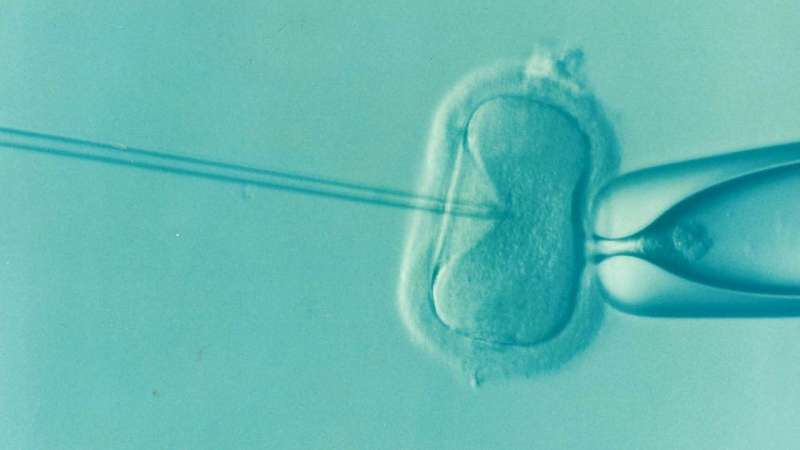
Credit: CC0 Public Domain
For some people, getting pregnant can be a challenge. That’s why more and more people are turning to in vitro fertilization, or IVF, which offers hope to couples and individuals trying to conceive.
But as IVF has become more popular, myths about IVF have emerged, including its effectiveness and safety, making it difficult to know what is true.
“The best thing you can do is find a doctor and a practice that you feel comfortable with,” says John Rinehart, MD, a reproductive endocrinologist at Rush. “And make sure you know the facts, especially the evidence-based ones.”
Considering IVF? Rinehart debunks common myths.
1. Myth: IVF is not effective
Fact: IVF can be successful.
In IVF, an egg is fertilized with sperm in a laboratory dish. The resulting embryo is then transferred back into the uterus to create a pregnancy.
Since its inception in the late 1970s, IVF has only grown in success. Nearly 9 million babies have been conceived through the procedure. And about one in every 50 babies born in the U.S. each year is conceived through the procedure.
Rinehart adds that IVF success rates can be as high as 90 percent, but more than one round may be needed depending on whether there are underlying problems.
“In some areas, IVF is quite successful,” he says. “It really depends on the technology, your technician, and the disease itself.”
2. Myth: IVF is only for female infertility
Fact: IVF is intended for female and male infertility.
IVF is often recommended if you or your partner have a range of conditions, including infertility. And if you have struggled to conceive after 12 months or more of regular sex, or six months if you are 35 or over, you may be dealing with infertility.
According to Rinehart, infertility is a symptom and not a cause.
“In order to know if IVF is a good option for you and your partner, you have to have a diagnosis,” he says. “And in order to have a diagnosis, you have to look at all the factors, both male and female.”
He adds that a third of all IVF cases are caused by men and about 10% to 20% are a combination of both men and women.
Infertility in men can be caused by a disturbance of testicular or ejaculatory function, but also by hormonal and genetic disorders.
3. Myth: Age doesn’t matter
Fact: Age is one of the biggest factors affecting infertility.
Research shows that 50% of IVF procedures in women 35 and younger result in delivery, while in women 42 and older, 3.9% of egg transplants result in delivery.
Regardless of whether you exercise regularly and eat healthy, age is still the most important factor. This is because even though a person may be healthy, the ovaries have still undergone the aging process.
4. Myth: Stress causes infertility
Fact: Not directly.
“Going through IVF is a very stressful experience,” Rinehart says. “And while stress is not a direct cause of infertility, there is no reason why you can’t treat the anxiety and help people get through it.”
Rinehart adds that if you address stress, you and your partner may be willing to undergo more than one treatment cycle, which can increase your overall chances of pregnancy.
A study found that men and women who sought fertility treatment and participated in talk therapy and mindfulness were more than twice as likely to conceive than couples who did not use these coping strategies.
5. Myth: IVF causes cancer
Fact: IVF does not increase the risk of cancer.
Whether it is cervical, uterine, ovarian or breast cancer, IVF does not increase the risk of these diseases in women. But that does not mean it is not possible.
For example, about 37% of people who use IVF are under 35. And the majority are 35 or older, with more than 20% being at least 41. That means women are more likely to undergo infertility treatments at a time when their risk of breast cancer is higher due to their age.
If you’ve had cancer, you may also wonder if the hormones in IVF can cause the disease to return. But research continues to show that short-term use of these hormones does not increase or worsen your risk of developing cancer.
6. Myth: IVF causes multiple pregnancies
Fact: With IVF, the chance of multiple pregnancies is small.
Rinehart says that twins and triplets were common in the early days of IVF because of limited information about the embryos, leading to embryo transfers and a higher chance of multiple pregnancies.
“We now have more information about the embryos, so we no longer recommend transferring more than one embryo at a time,” he says. “But you can still have twins with IVF, just as often as you would if you were to conceive naturally, which is around 2%.”
7. Myth: IVF is not safe
Fact: IVF is generally a safe procedure.
Rinehart says IVF is relatively safe, but notes that it is still a medical procedure and carries risks. These can include overstimulation of the ovaries, or ovarian hyperstimulation syndrome, polycystic ovary syndrome, and infections and bleeding.
“The risks are quite low,” Rinehart says. “The reality is that the risk is much higher to have a child than to try IVF.”
Quote: Reproductive endocrinologist debunks 7 common myths about IVF (2024, September 6) Retrieved September 6, 2024, from https://medicalxpress.com/news/2024-09-reproductive-endocrinologist-debunks-common-myths.html
This document is subject to copyright. Except for fair dealing for private study or research, no part may be reproduced without written permission. The contents are supplied for information purposes only.
 Healthy Famz Healthy Family News essential tips for a healthy family. Explore practical advice to keep your family happy and healthy.
Healthy Famz Healthy Family News essential tips for a healthy family. Explore practical advice to keep your family happy and healthy.


